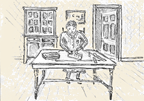Miss Dunton's life very nearly spanned one hundred years—she was
born August 11, 1901 and died on July 12, 2001. She taught in rural schools
around Naples and Bristol and in Springwater before teaching in Hornell
from 1931 until her retirement in 1964.
When South Bristol's Wilder Cemetery was rededicated in June of 1998,
Gladys Dunton was in the front row of spectators, beaming with pleasure.
For at least 25 years she had campaigned for the restoration of this
earliest of Town cemeteries where lie the founding father, Gamaliel
Wilder, as well as Dunton ancestors. The newly organized South Bristol
Historical Society had tackled the formidable work of clearing trees
and brush. Gravestones were uncovered, the ceremony planned, and no
one was more pleased to be present than Gladys Dunton, who was then
nearly 97.
While living very much in the present, she remembers her early life
with uncommon clarity. She is descended from William Dunton who came
to Naples from Natick, Massachusetts, in 1793. Naples village, where
she was born in 1901 to Albert and Carrie Dunton, was a lively community.
Like other small towns of that period, Naples was keen about bands and
music. Her father led his own band and orchestra for over twenty years
and his enthusiasm became her own. Rehearsals were often held at home;
the house still stands on Main Street next to the venerable Orange Inn,
but its exterior has been greatly altered.
As she grew up, her world widened. She earned a Bachelor's degree
from Geneseo State Teachers College. Her teaching career began in a
small rural school; she moved on to spend 33 years in a North Hornell
school. She traveled both in this country and abroad and enjoyed music
and drama in Rochester. For over 40 years she lived in a converted country
schoolhouse in Springwater, gardening, hiking and birdwatching. In 1990
her home was sold. She now has an apartment in Canandaigua.
Gladys Dunton's interest in preserving the details of small town life
early in this century has not diminished. She looks back on her past
with satisfaction, appreciation and humor and her own words reveal a
quiet courage as well: "I never married—I found out when I started
teaching that they did not hire married teachers. Having elderly parents
depending on me and needing to teach, I ended my marriage plans. I had
a very pleasant life and a sister whose children were always 'my children'."




